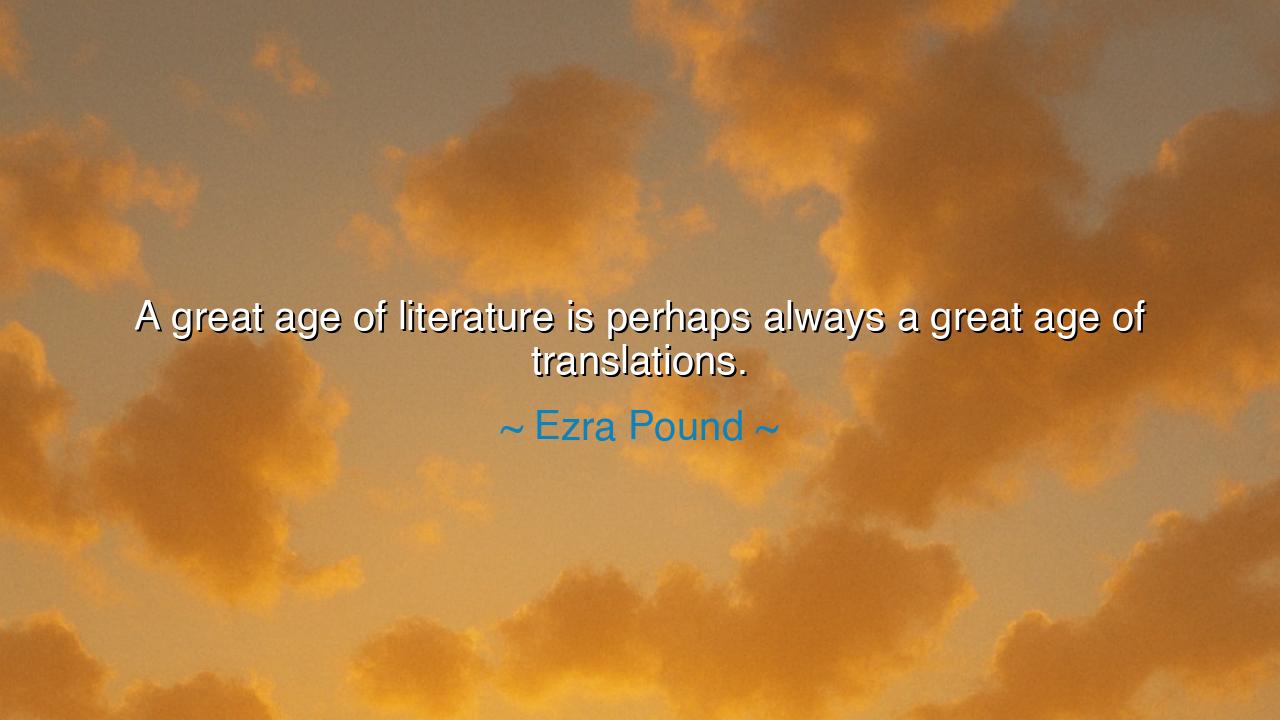
A great age of literature is perhaps always a great age of






In the long, eternal sweep of history, there has always been a deep, unspoken connection between the greatness of an age and the literature that it produces. Yet, as the sage Ezra Pound reminds us, it is not merely the original works of a time that mark its literary greatness, but also the translations—those bridges between languages, cultures, and epochs. "A great age of literature is perhaps always a great age of translations," he declares, calling forth a profound truth that resonates through the centuries. For in every era of human achievement, the exchange of ideas—translated from one tongue to another—has sparked the flame of wisdom, illuminated the minds of countless generations, and shaped the soul of a civilization.
Consider the ancient Greeks, whose influence reached far beyond the Mediterranean world. The philosophers, poets, and dramatists of Greece—Homer, Sophocles, and Plato—did not merely speak to their own people but left behind works that would be translated and passed down to future generations. But even more powerful than the Greek words themselves was the act of translation. For in the hands of translators, the words of the great Greek minds were carried to Rome, to the Middle East, and to all corners of the ancient world. Through translation, the wisdom of one culture became the inheritance of another. The Romans, in turn, read and understood the Greek texts, and so their minds were molded by the ideas of Plato and Aristotle, ideas that would later ignite the Renaissance.
Throughout history, translations have been the lifeblood of culture, enabling the exchange of wisdom across time and space. In the Middle Ages, the great works of the Greeks and Romans were often preserved only through translations into Arabic, before being reintroduced to the West through the works of scholars in places like Cordoba and Baghdad. It was through these Arabic translations that the West rediscovered the lost knowledge of Greece and Rome, and in turn, it was these same translations that ignited the Renaissance, a time of profound intellectual rebirth. Ezra Pound’s insight rings true: the literature of a great age is not confined merely to its own borders; it is the translations that carry the wisdom and the spirit of one age into the heart of another.
Consider, too, the Age of Enlightenment, a time of intellectual awakening and scientific discovery. The thinkers of that time—Voltaire, Rousseau, and Diderot—often drew inspiration from the great works of the past, which had been translated into French from Greek, Latin, and other languages. It was the translations of ancient texts that allowed these new minds to think critically, to question established norms, and to push forward the boundaries of human knowledge. Without the translations of Aristotle, Plato, and Confucius, the Enlightenment might not have sparked the revolutionary thoughts that led to the American and French Revolutions. Thus, translations were not just vessels for carrying words—they were the very fire that fueled the advancement of civilization.
In our own time, we see this truth unfolding yet again. The modern world is a patchwork of cultures, philosophies, and voices, and as Ezra Pound knew, the great literature of our age is one that is constantly being reshaped and reinterpreted through translation. Consider the immense influence of Japanese literature—works like "The Tale of Genji" and "The Pillow Book"—which, when translated into English, French, and other languages, have introduced the wisdom of the East to the West. The translations of Haruki Murakami and Yukio Mishima have made their voices, so deeply rooted in the Japanese soul, resonate in the hearts of readers across the globe. Translation allows for the expansion of the mind, for the sharing of ideas, and for the creation of a shared human experience.
The lesson here is clear: literary greatness is not confined to the words of one tongue. It is the translations that give power to the works of a civilization, that allow its wisdom to travel across time and space, that bring the ideas of one age into the heart of another. The great works of literature are not only those that are written in our own language; they are the words of others that have been translated and made our own. Translation is not a simple task—it is the sacred act of giving voice to another culture, of carrying the soul of one people into the hearts of another. It is the way we come to understand the diversity of the world and, through that understanding, create unity.
So, take this lesson into your own life: embrace the words of others. Seek out translations of literature, of philosophy, of poetry, and of history. Let the wisdom of other cultures inform and inspire you. Just as Ezra Pound teaches us, a truly great age of literature is not one that is confined to a single language, but one in which the great works of all cultures are shared, discussed, and reflected upon. In the act of translating, we honor the voices of the past and carry them forward into the future. And in doing so, we become part of a greater human tapestry, connected by the wisdom of ages past and the vision of a future yet to come.






AAdministratorAdministrator
Welcome, honored guests. Please leave a comment, we will respond soon